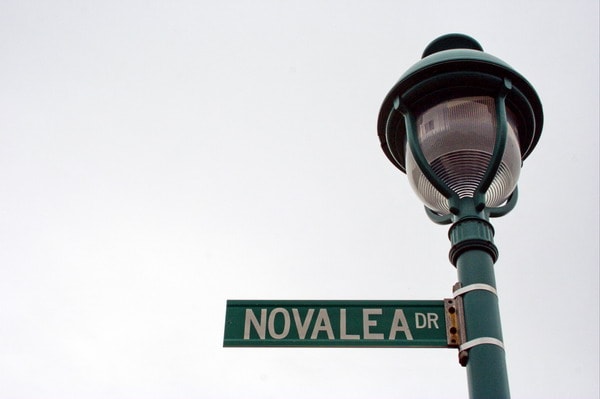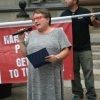KJIPUKTUK (Halifax) – Gottingen Street, one of Halifax main thoroughfares, used to extend into the far North End. But in 1981 Halifax Council voted that the northern segment of Gottingen Street, beyond the Young Street intersection, now be called Novalea Drive.
The reasons behind that decision were tainted by racism and prejudice, and a survey of residents’ opinions conducted by the City purposely excluded most residents who lived along the street.

With that name change Halifax, if not erased, certainly diminished a venerable street name that had been around since 1764, when settlers from Germany petitioned the government to name their street Gottingen. More than that, the decision diminished a community, allowing it to be called a slum, and sending a message to its residents that their opinion didn’t matter.
“Whenever I pass through the intersection of Novalea and Duffus, I have that visual reminder. I sit at that intersection and I look at that Novalea sign and I think that sign is just wrong,” Kevin Collins tells the Nova Scotia Advocate. “In terms of access to the city, Gottingen Street was a main artery, and there was a lot of history there. And that history was thrown away.”
Collins has lived in the North End for twenty years or so, and did most of the research referenced in this article. He contacted the Nova Scotia Advocate after reading our recent story about the restoration of the Lucasville community boundaries, a story he believes bears many similarities with what transpired in his beloved North End in the early eighties.
“I have suggested to Councillor Smith, as well as other Council members, that the name Gottingen should be repatriated to the northern limits of the peninsula. This is the historical name that is steeped in over 250 years of history. Novalea IS Gottingen – plain and simple,” he wrote to us in that first email.
One thing Collins uncovered was that the decision to go ahead and change the name was far from democratic. Only the residents who lived along the proposed Novalea portion of Gottingen Street were consulted. Residents along Gottingen Street as we know it today were never asked.
Tired of living under the Gottingen Street stigma
Responses collected in the survey conducted by City staff show how classism and racism undoubtedly played a part in the residents’ opinions, sentiments that were further fanned by fresh memories of a riot of sorts at the Gottingen Street police office during the infamous Halifax police strike.
To give you a sense of those responses, here are some quotes from that city-conducted survey that I believe to be reflective of the majority, not to suggest that support among residents was unanimous.
“Tired of living under the Gottingen Street stigma.”
“We would like the name of Gottingen Street changed to Novalea Drive, because we are of people thinking we are in a “Slum Area”, we take pride in our homes in the north end.
“If other streets such as Carson Street, part of Creighton can get changed, why not Gottingen Street. Our family travels widely over Canada, when asked where in Halifax we live, we say “Gottingen Street”, they say they· “know where that is” because. of its reputation. It’s embarrassing always having to explain to people where on Gottingen Street you live.”
“Furthermore, when the news media refer to any element of crime in this City it chooses always to use the term “North End” which implies to a vast majority of people north Gottingen Street, a false impression to say the least, the criminal act could have taken place on north Connaught Avenue for example.”
The renaming was a project of Alderman Gerald O’Malley, who represented the residents of that part of the North End. Alderman Graham Downey, the first Black Councillor in Halifax history, was opposed to the name change, but received very little support from his fellow councillors. Downey was overwhelmingly outvoted both when he asks for public consultation of all North End residents prior to the vote, and shortly after, when the actual name change was voted on.
The formal justification for the change was that the Novalea part of Gottingen is residential in nature, and what is still Gottingen today was a business area. That argument doesn’t convince Collins. “I never heard of efforts to rename Quinpool Road west of Connaught Avenue,” he says.
There are scars to this day
African Nova Scotian activist Lynn Jones vividly remembers the day part of Gottingen became Novalea. For residents along Gottingen the name change was yet another blow to their self esteem.
To add insult to injury, all this transpired while neither City nor any other level of government made a serious effort to slow the deterioration of their once bustling neighborhood, says Jones.
In fact, City Hall decisions hastened the decline of the street through the promotion of suburban shopping centres and absence of serious planning policies, while the creation of the Cogswell Interchange isolated the neighborhood from the downtown.
“At the time I did all my activism in the North End,” says Jones. “People were extremely vocal, it was the biggest news. And to this day people who were around at the time still call it Gottingen, they refuse to call it Novalea. So there are scars to this day.”
“There was a constant outcry. It affected the whole community, not just a Black vs white issue, it was also a class issue. People didn’t have a voice. No person was providing leadership to the community at that time. It was more a on the street discussion, people felt powerless. There was no organized action that I was aware off,” she says.
In terms of solution, Jones is very much in favour of restoring Gottingen Street to its original extent. But she doesn’t believe that would be enough.
“The result is not just to change the name back, that doesn’t solve the problem,” she says. “You have to ask, how could you address each of the groups of residents’ concerns. Maybe you needs to put more money into housing, I don’t know.”
Acknowledging mistakes, moving forward
When asked whether it is worth restoring the Gottingen street name when it may stir up so many old divisions, Collins doesn’t hesitate.
“A lot of what transpires in the world today entails learning from the past, acknowledging the mistakes that were made, and making things right,” he says.
Collins refers to Halifax Council’s decision just a short while ago to restore the historic community boundaries of Lucasville.
“You could argue that it was a divisive decision by Council, but it is about doing the right thing, acknowledging the past, respecting those involved, and moving forward in a unified manner,” says Collins.
See also:
- You have mail, and it isn’t very nice. When white residents don’t want to live in a Black community
- Putting Lucasville on the map. African Nova Scotian community wants its boundaries finally resolved
If you can, please support the Nova Scotia Advocate so that it can continue to cover issues such as poverty, racism, exclusion, workers’ rights and the environment in Nova Scotia. A pay wall is not an option since it would exclude many readers who don’t have any disposable income at all. We rely entirely on one-time donations and a tiny but mighty group of kindhearted monthly sustainers. We are running this site on a shoestring budget. Just imagine what we could do if we had more money.




My father participated in this type of thing too, when he was on the Home and School Association (possibly the chair, I don’t know for sure) for what was originally Mulgrave Park School, which they voted to rename Highland Park School, to disassociate the school from the Mulgrave Park public housing development.
This article solves a mystery for me. My earliest memories are from the north end of Halifax where we lived in a small house on Gottingen St. After living out of the province for many years I decided to “pop by the old neighbourhood” and I recognized what I thought was the place between Rector and Duffus streets but the Novalea street sign threw me off and I began to have doubts. This clears it up. It is sad really that the street name was changed for the reasons it was, but sadder still is the decline of the street since those days in the 1950s. My mom said she was proud to live there and spoke of a very prosperous and busy shopping district on the street in those days.